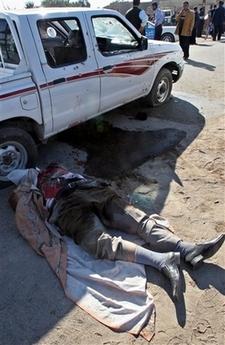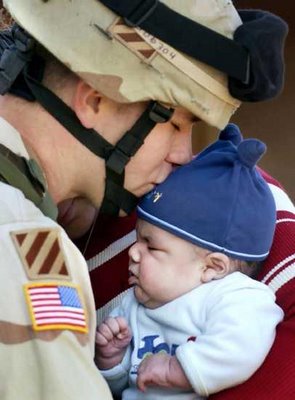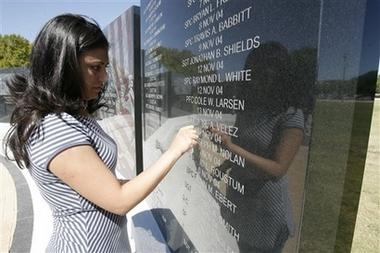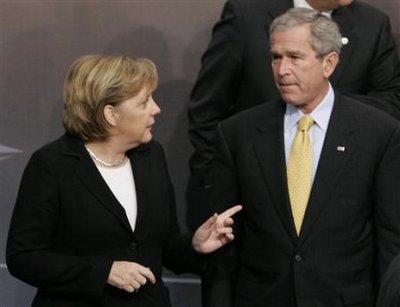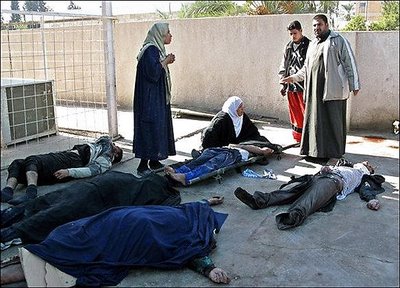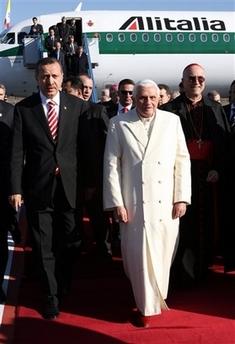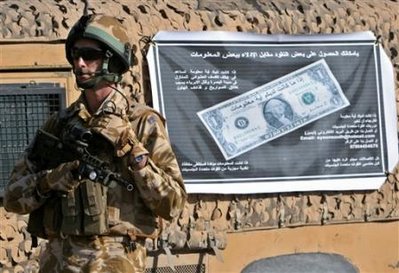Saturday, December 02, 2006
Rumsfeld's last gasp
Reading the memo itself, what struck me was the scattershot suggestions, some of which contradicted others. It really reads like he had no idea how to proceed, but felt he needed to say something to try and save his job.
(And let's remember that this tower of efficacy was kept in his position for months out of mid-term political considerations.)
Good riddance.
I wish someone would just say it
This AP piece approaches it very backhandedly,
Saudi Arabia, a key U.S. ally in the region, has been putting its economic and diplomatic weight behind groups in direct confrontation with factions backed by Iran in every major conflict zone in the region — Iraq, Lebanon and the Palestinian territories.
The reality is that by tragically converting Iraq from a secular state to a Shia dominated state, the US has altered the long term balance in the middle east. Iraq was the counterbalance to Iran, and now that it is gone, the Saudis have to take up that role.
Again, the failures are far bigger than just Iraq.
That last bit of pork
Picture of the Day - 2

Smoke rises from the site where three car bombs exploded in central Baghdad. More than 50 people have been killed as a triple car bomb attack rocked the centre of the Iraqi capital, in a gruesome reminder of similar bombings in a Shiite district of Baghdad the previous week.(AFP/Joseph Eid)
Hagel on withdrawal
Two flaws. It assumes that the Shia led government will have the ability to excercise that much control over Anbar, and it assumes that the Saudis and Egyptians won't fund a Sunni resistance, a portion of which would inevitably flow into the hands of al Qaeda in Iraq.
But, still, an interesting argument challenging one of the basic precepts of his president.
The "trainer" theory
This situation cannot be resolved by force. If it could, the US military would have accomplished it by now. Although a stronger Iraqi force will shift the balance a bit in any final negotiations, the only viable end is a political solution.
(And, by the way, I wonder at the wisdom of reducing troops while increasing trainers. It would seem that you could easily end up in a situation where alot of the 5,000 trainers end up exposed without enough backup. If their trainees flee or fight ineffectively, we could end up with alot of "handholders" in alot of trouble.)
Picture of the Day

New York State Troopers, left, salute as others hold their hands to their hearts carrying the American flag as the funeral procession for Sgt. 1st Class Schuyler B. Haynes makes its way north on the New York State Thruway, Thursday, Nov. 30, 2006 in Albany, N.Y. Haynes a direct descended of Philip Schuyler, a wealthy 18th-century landowner and patriot who served in the British colonial forces and later as one of four major generals in George Washington's Continental Army, died Nov. 15 in Baquba, Iraq, of injuries suffered when an improvised explosive device detonated near his vehicle during combat operations. (AP Photo/Mary Altaffer)
The Reality Gap (or why Iraq is doomed to fail)
The killer misunderstanding here, and I mean that literally, is that this White House has yet to accept that their current course has not worked and no longer matches the realities on the ground.
So long as policy is set separate from reality, there is no chance that its application will be effective, and the longer it's put off, the worse the choices will be.
With the Iraq Study Group report due on Wednesday, the Bush administration has notified allies that it will not budge on certain aspects of Iraq policy, whatever recommendations are put forth by the independent panel of 10 prominent Republicans and Democrats.
At a private briefing for diplomats this past Wednesday, State Department and National Security Council officials said they do not expect any major policy shifts to emerge from either a White House review or the bipartisan panel,....
Who exactly is advising the White House to maintain this course in the face of almost all educated, outside advice? And, perhaps more precisely, what has been their track record on Iraq predictions? Rice? Hadley? Cheney? There are no "new eyes."
Perhaps that's the reality gap.
Cambone is out
Friday, December 01, 2006
Picture of the Day - 3
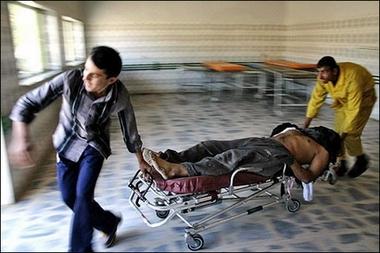
Iraqi hospital workers wheel the body of a violence victim into the morgue of a hospital in the restive city of Baquba northeast of Baghdad, November 2006. US President George W. Bush warned against expectations he will lay out plans for "a graceful exit" from Iraq, as news reports said the independent commission looking into Iraq policy will call for a 2008 withdrawal of US combat troops.(AFP/File/Ali Yussef)
Brace yourself
Assuming the extrapolation holds, the UN number would be somewhere around 5,320 in November or about 177 a day.
(And do I need to add "at least"?)
The failure is bigger than Iraq
But beyond the Muslim world, China has also very quietly rewritten their place in the world and South American countries are electing openly anti-American governments one by one. The empire is losing against its likely next rival and seeing its influence fail among its client states.
The thing I think isn't discussed as much is just what a radical departure this foreign policy is from that of Bush I and Clinton.
The "new world order" philosophy of foreign relations was born of the realism that this will not be another American century, and that, within that reality, the US should attempt to construct an international sysytem to its long term favor while it still holds the dominant position.
The foreign policy theorists largely from PNAC, believed that this realist strategy was unnecessarily pessimistic and that the US could parlay its military advantages into a maintenance of its world position primarily by limiting China through the control of oil.
But, there are two primary mistakes in that ideological pipe dream. The first that we are seeing played out in Iraq is that the US military structure was constructed to have its tremendous advantage against large state entities. In other words, the US military is fully constructed to take over countries, but it lacks capacity to occupy them. It's advantage was built for a ground war against Russia, not to implement "democracies" at the point of a gun.
Second, and more troublingly, this decision to largely abandon international structures and attempt to pursue a unilateral domination is a bit of a one way street. As the US now looks to go back to the international community for help on Iraq, Afghanistan, Iran, North Korea, and other less critical situations, it will find itself met by the hostility generated by the original abrogations.
Coupled with the perceived weakness of this failed unilateral foreign policy, the US will attempt to return to the international community accepting their terms, not dictating our own.
We are just beginning to see the results for this epicly poor decision to abandon the rationalist foreign policy of the last two administrations, but the real damage will trickle down for generations in the shaping of trade deals, international treaties, and global diplomacy.
Even if a new administration were to come in tomorrow, they would be looking at a far weaker diplomatic hand and would enter every relationship asking rather than telling.
This is how empires die. They overextend. Full of themselves and belief in their strength, they push their resources too far and find themselves suddenly trapped with economic provinces peeling away, strapping debt, and a rising rival.
As the US feels its relationships growing more brittle, China is making energy and trade inroads in South Asia, the Middle East, northern Africa, and Latin America.
America will not disappear tomorrow, but the seeds for a more rapid subsidence have been laid today.
It's funny, in 2003 and 2004 you couldn't shut them up, but nobody's talking "empire" anymore.
(****Sorry for the long rant, but the blogging had sort of stalled, and I felt I needed to step back and reframe a bit.)
Picture of the Day - 2

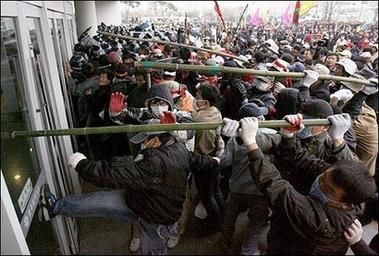

The protests in Lebanon are far more significant, but nobody riots like the South Koreans.
(These photos are from an anti-free trade agreement protest on Nov. 22. Photo credits - (AP Photo/Ahn Young-joon), (AFP/Park Yeong-Cheol), (AP Photo/ Yonhap, Lee Sang-hak)
Maybe it's time for a DVD
The reality, say several aides who did not wish to be quoted because it might displease the president, did not really sink in until Thursday night. Some White House staffers were watching the evening news and thought the president needed to see the horrific reports coming out of New Orleans. Counselor Bartlett made up a DVD of the newscasts so Bush could see them in their entirety as he flew down to the Gulf Coast the next morning on Air Force One.
"How this could be—how the president of the United States could have even less "situational awareness," as they say in the military, than the average American...?"
That's what I've been asking myself for months.
Political bits - Speaking of lost causes....
Don't miss the WaPo article on Weldon cleaning out his office.
Growing in the "lost cause" category, Boston.com has an article on Mitt Romney's lawn service who employed legions of illegal aliens. (Sorry, Mitt, they're out to get you now.)
Sadr, top Sunnis unite to oppose Maliki
And what does Sadr do? He convinces these two top Sunni politicians and blood enemies to side with him against Maliki and the US.
BAGHDAD, Iraq - Iraqi Prime Minister Nouri al-Maliki faced a widening revolt within his divided government as two senior Sunni politicians joined prominent Shiite lawmakers and Cabinet members in criticizing his policies.
Vice President Tariq al-Hashemi said he wanted to see al-Maliki's government gone and another "understanding" for a new coalition put in place with guarantees that ensure collective decision making.....
Al-Maliki's No. 2, Deputy Prime Minister Salam Zikam Ali al-Zubaie, also a Sunni, argued that the president's government failed to curb the spread of sectarian politics.
The White House can debate backing or abandoning the Sunnis all they want, but Sadr is running the country right now. That is the reality.
Picture of the Day

Blindfolded detainees are held at the Iraqi Army base in Baqouba, 60 kilometers (35 miles) northeast of Baghdad, Iraq, Tuesday, Nov. 28, 2006. Fierce fighting between Iraqi security forces and Sunni-Arab insurgents raged for a second day in Diyala province, resulting with 17 insurgents killed, 15 detained 20 civilians kidnapped, three bodies found, one U.S. Marine killed and two wounded. (AP Photo)
Thursday, November 30, 2006
And the last option is....
The Bush administration is deliberating whether to abandon U.S. reconciliation efforts with Sunni insurgents and instead give priority to Shiites and Kurds, who won elections and now dominate the government, according to U.S. officials.
Just as the "pro-moderate Sunni" solution was "leaked" just two days ago before the Maliki meeting, I would guess that this is a leverage point as the US returns, post Maliki meeting, to diplomacy with the Saudis.
(These competing theories do reflect a genuine split within the administration, but thus far, there's no real indication that "picking a side" has reached Bush's sense of possibilities.)
Calm down. Putin didn't poison Litvinenko
If this was the Russian government, ex-KGB, or whatever, after 40 years of leading edge chemical and biological weapons research, don't you think they have something better than a radioactive isotope that leaves traces everywhere this guy goes?
Doesn't that seem to indicate someone who wants the killing to be traced back to the Russians rather than the Russians themselves?
Later: Looks like I'm not alone. The Guardian,
British intelligence sources increasingly suspect that Alexander Litvinenko, the former spy killed with a radioactive poison, was the victim of a plot involving "rogue elements" within the Russian state, the Guardian has learned.
(Also: I know this is alpha radiation we're talking about here, but, still, shouldn't I be concerned that three planes were flying around with radioactive traces and no one in this post 9-11/dirty bomb world even noticed?)
The Horn of Africa
(BBC) "An Ethiopian military convoy in Somalia has been ambushed by fighters loyal to the powerful Union of Islamic Courts." (Maybe 20 dead.)
(BBC) "At least 300 people were killed in clashes between Sudan's army and former rebels in the south earlier this week, aid workers say."
Too late
All of the actions being taken now, like the firing of Rumsfeld, could have been taken three or six months ago, but weren't because of political considerations.
Of all the sins, this one may be the worst, and as this history is being lived and written, it should not be forgotten.
Preparing for the "last throes"
Rival Shi'ite and Sunni groups are massing their militias in expectation of major confrontations, Iraqis say, even as President Bush prepares to meet today with the nation's embattled prime minister, Nouri al-Maliki.....
But Iraqis on both sides of their nation's sectarian divide report worrisome signs that the conflict will soon evolve into pitched battles between large armed groups.
One secular Shi'ite speaking on the telephone from Baghdad said Shi'ite militias were massing in preparation for a large offensive against Sunnis in the capital.
Large troop concentrations gathering for street battles? If true, that settles any debate as to whether this is a civil war.
Picture of the Day
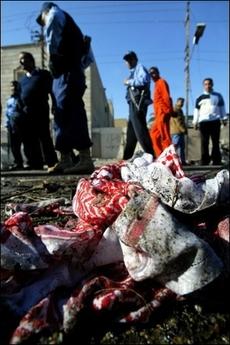
A traditional Arab headscarf lies on the ground at the site where a car bomb exploded outside Yarmuk hospital in west Baghdad. Rival visions of how to save Iraq were on display as US and regional leaders engaged in a flurry of diplomatic meetings designed to halt an inexorable spiral towards civil war.(AFP/Wisam Sami)
Wednesday, November 29, 2006
ISG = "non-starter"
The bipartisan Iraq Study Group reached a consensus on Wednesday on a final report that will call for a gradual pullback of the 15 American combat brigades now in Iraq but stop short of setting a firm timetable for their withdrawal, according to people familiar with the panel’s deliberations.....
The report recommends that Mr. Bush make it clear that he intends to start the withdrawal relatively soon, and people familiar with the debate over the final language said the implicit message was that the process should begin sometime next year.....
As described by the people involved in the deliberations, the bulk of the report by the Baker-Hamilton group focused on a recommendation that the United States devise a far more aggressive diplomatic initiative in the Middle East than Mr. Bush has been willing to attempt so far, including direct engagement with Iran and Syria.
I don't see a change from this White House, but with the current press mood and the ISG plan now established as "the center," the Bush administration will have to fight for and justify every inch. This report will not be change, but it will serve as a lever of pressure for change.
Picture of the Day - 5

US President George W. Bush has ruled out an early withdrawal of US troops from Iraq "before the mission is complete", amid growing pressure for him to bring the forces home.(AFP/Jim Watson)
Elsewhere, same picture different caption:
US President George W. Bush says it is up to Iraq to decide whether its neighbours Iran and Syria should be more involved in helping to re-establish security there.(AFP/Jim Watson)
Just what kind of mess we're in
(By the way, I'm pleased to see rational, knowlegable analysts get airtime, but why weren't they allowed on six months ago? An intelligent discourse might have made a difference then.)
Homey don't play that.
As I said below, the memo "leak" is about boxing out Maliki's choices, and in this snub, Maliki is pushing back.
And, amid the gossipy, "gotcha" coverage in the US press, don't miss the far more significant response,
Iraq's president said Wednesday he had reached a security agreement with Iran, which the United States accuses of fueling the chaos in the war-torn country. Iran's president called on countries to stop backing "terrorists" in Iraq and for the Americans to withdraw....
"We discussed in the fields of security, economy, oil and industry. Our agreement was complete," Talabani told reporters. "This visit was 100 percent successful. Its result will appear soon."
The US is trying to lever Iraq away from Iran and force Maliki to choose. Forcing this choice is a fairly big risk.
As trial lawyers often say, "never ask a question you don't already know the answer to."
Political bits
Hotline outlines the Obama '08 tea leaves.
They're also starting to go after Hillary Clinton. (Obviously, the 2006 Republican lesson was that they didn't go negative early enough.)
Standing with the majority of Americans for the first time, Frist has decided not to run for President.
Picture of the Day - 2

Iraqi women react following an assassination attempt on Gov. Abdul Rahman Mustafa and his bodyguards, in Kirkuk, Tuesday, Nov. 28, 2006. Iraqi governor survived an assassination attempt when a suicide bomber blew himself up near the official's convoy, killing one civilian and wounding 17, police said. (AP Photo/Yahye Ahmed)
The Hadley memo in the NYTimes
There will be a lot written about this memo, I'm sure, but the politics of it intrigues me most.
An administration official made a copy of the document available to a New York Times reporter seeking information on the administration’s policy review. The Times read and transcribed the memo.
So, it's not even couched under the pretense of a leak. The administration (Hadley?) wanted this out there ahead of the meeting today. (Was the memo written just for this release?)
Releasing this memo puts a clarified choice to Maliki as he comes to the summit today. With the Sadr threat of a boycott/ withdrawal, and a the public discussion of the Saudi/moderate Sunni plan, the administration has crafted a sharp decision point for Maliki.
If he takes one step towards the US/Saudi plan, Mahdi suddenly becomes his enemy which would stop his protection of Mahdi militias and force him onto the path the US wants.
If he doesn't, and chooses to stay with the Sadr backing, I'm guessing there's a threat of US withdrawal/redeployment outside the cities or other security threat to him.
Also: Add as a backside threat to Maliki, "the stick" of Saudi support for the Sunni militias. Nawaf Obeid (just coincidentally) publishes an editorial today in the WaPo saying that the Saudis will openly arm and supply the Sunnis in the case of a US withdrawal.
So, the choice being presented to Maliki, very publicly, appears to be, embrace the US plan and Sunni moderates or "we'll give you a civil war."
(Probably add to this threat the report last night that the US is considering pulling the Marines out of Sunni Anbar to put them in Baghdad.(A threat of a Sunni safe haven? to Sadr City?))
This is a big gamble and heavy handed politics. We'll have to wait and see.
Pakistan urges NATO negotiations with Taleban
Senior Pakistani officials are urging Nato countries to accept the Taliban and work towards a new coalition government in Kabul that might exclude the Afghan president Hamid Karzai.
Pakistan's foreign minister, Khurshid Kasuri, has said in private briefings to foreign ministers of some Nato member states that the Taliban are winning the war in Afghanistan and Nato is bound to fail. He has advised against sending more troops.
Tuesday, November 28, 2006
US out of Anbar?
ABC News has learned that Pentagon officials are considering a major strategic shift in Iraq, to move U.S. forces out of the dangerous Sunni-dominated al-Anbar province and join the fight to secure Baghdad.
Appreciate this for a moment. On the same day that Bush blamed Al Qaeda for inciting the violence in Iraq, the Pentagon is contemplating abandoning the province from which they are launching attacks.
(Again, Mr. Bush, if Al Qaeda is reponsible for fomenting sectarian violence, and sectarian violence is exploding out of control, doesn't that mean they're winning?)
It's a good thing the President is wrong, otherwise, he might look pretty stupid, eh?
Then, you have a report that McCain was the last ISG interview. He's advocating "first getting Sunni areas under control, to show Shiites that they do not need militias to protect themselves from Sunni attacks."
(McCain's interview "had been deferred from an earlier date." His aide tries to make it sound "hastily organized" and important, but I'd guess since they're already in deliberations, he was "hastily" interviewed for the politics of appearance.)
Picture of the Day - 5

In this image provided by the Hamill Family via WTIC-TV Fox 61, shown is Army Capt. Jason Hamill, date and location unknown. Hamill, a Connecticut native who was about to end his one-year tour of duty in Iraq, was killed Sunday, Nov. 26, 2006, in Baghdad, his father said Monday. (AP Photo/Hamill Family via WTIC-TV Fox 61)
Picture of the Day - 4
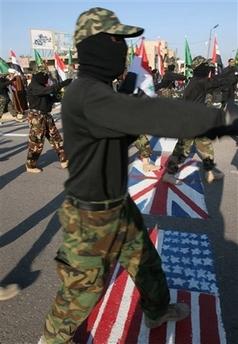
Members of the Mahdi Army militia of radical anti-American cleric Muqtada al-Sadr march over the British, American and the Israeli flags in Basra, Iraq's second-largest city, Tuesday, Nov. 28, 2006. Hundreds of Sadrists marched through the city to mark the seventh anniversary of the assassination of the cleric's father, Mohammed Sadiq al-Sadr, a revered Shiite religious leader. (AP Photo/Nabil Al Jurani)
Quickhits
(BBC) "Many EU nations were aware that the CIA used their territory for the transfer or detention of terror suspects, a draft European parliament report says."
(ABCNews/Blotter) "The Taliban and al Qaeda have become so emboldened by recent events in Pakistan that senior al Qaeda operatives have been spotted "walking and talking openly" in the market of Mir Ali in North Waziristan, according to analysts at the British Joint Intelligence Committee."
(AFP) Afghanistan is undermanned and under equipped. "NATO Secretary General Jaap de Hoop Scheffer has hit out at alliance countries for failing to provide reinforcements in insurgency-hit Afghanistan...... "It is not acceptable that our mission in the south still lacks 20 percent of its requirements."
(WSJ) The White House issued a correction correction of the transcript of today’s press conference in Tallinn, Estonia.
THE PRESIDENT: “I will assure him that we will continue to pursue al Qaeda to make sure that they *do not* establish a safe haven in Iraq.”
Democracy in Iraq
BAGHDAD, Nov 27 (Reuters) - Iraq's parliament will bar the media from future sessions and began on Monday by refusing access to reporters and then cutting off television coverage as a debate on mounting sectarian violence became heated.Also: "Parliament voted unanimously Tuesday to extend Iraq's state of emergency for 30 more days" as it has done every thirty days since it was introduced in Nov. 2004.
Spokesmen for the government and parliament said it was part of efforts, newly agreed by Iraq's National Security Council, to stop political leaders contradicting each other in public and prevent media coverage that was deemed to inflame conflicts.
"If there is any tension in the state, then the media should be kept out because it may increase tension," speaker Mahmoud al-Mashhadani told lawmakers in a televised session after dozens of journalists were barred from the building by security guards.
When one lawmaker rose to object, Mashhadani, from the Sunni minority, ordered the cameras turned off, effectively shutting off public access to a legislature whose election was held up by the United States as a beacon for democracy in the Middle East.
No transcript is published and journalists and members of the public have always been barred from the chamber itself.
The balance of power in the Middle East
"The main reason for the current situation in Iraq is the US policies that are being carried out by some intermediaries," the Iranian leader said.
So, who are the coded "intermediaries" he's talking about? Is this a veiled threat to the Saudis, Egyptians, and Jordanians to stay far clear of Iraq and its Sunnis, or his he simply playing politics with the Iraqi Shia mind?
Something intentional is being communicated here. To me, it sounds like a warning to the Saudis, but I don't know.
Later: Maybe it is a threat related to this,
When Mr. Bush and Ms. Rice arrive in Amman on Wednesday, they will try to enlist help from Sunni Arab leaders to try to rein in the violence in Iraq by putting pressure on Sunni insurgents.....
Specifically, the United States wants Saudi Arabia, Jordan and Egypt to work to drive a wedge between the Iraqi prime minister, Nuri Kamal al-Maliki, and the anti-American Shiite cleric Moktada al-Sadr, whose Mahdi Army has been behind many of the Shiite reprisal attacks in Iraq, a senior administration official said. That would require getting the predominantly Sunni Arab nations to work to get moderate Sunni Iraqis to support Mr. Maliki, a Shiite.
Has Israel agreed to the Israel-Palestine peace deal that's on offer? How does Maliki continue to govern(or live) once he abandons the Shia right? Is it better to have Shia militias going radical rather than the Baathists? Do the Saudis guarantee Sunni aid to make up for lost oil revenue?
How do the radical Sunni populations in Saudi and Egypt react?
Just questions right now.
Is Bush saying Al Qaeda is winning?
"The plan of Mr Zarqawi was to foment sectarian violence," he said, referring to the former leader of al Qaeda in Iraq killed by a U.S. air strike in June, Abu Musab al-Zarqawi. "That's what he said he wanted to do. "What you're seeing on TV started last February," he said. "It was an attempt by people to foment sectarian violence.
I'm not trying to be oversimplistic or "gotcha" here, I'm serious. Since the Askiriyah shrine bombing in Samarra, the US has known fairly precisely the goals of the 4,000-12,000 Al Qaeda/foreign fighters in Iraq and yet they're still proceeding successfully.
And, if you look at that big Ricks' article on Anbar in the WaPo, you really get a sense of that failure.
The U.S. military is no longer able to defeat a bloody insurgency in western Iraq or counter al-Qaeda's rising popularity there, according to newly disclosed details from a classified Marine Corps intelligence report that set off debate in recent months about the military's mission in Anbar province.....
Al-Qaeda itself, now an "integral part of the social fabric of western Iraq," has become so entrenched, autonomous and financially independent that U.S. forces no longer have the option "for a decapitating strike that would cripple the organization," the report says.
Now, I would agree with one of the criticisms from the article that Al Qaeda in Iraq is only one of the large forces acting in Anbar, (indigineous insurgency, ex-Baathists,) but the fact that Al Qaeda still exists and is still getting stronger tells me that among the, at least, four different conflicts being played out in Iraq, the US is losing this critical one.
(Of course, the irony that the US entered Iraq to end non-existent Al Qaeda ties cannot be understated.)
Finally, there is this AP story which states the unsurprising reality that despite the schedule for handover, the Iraqi Security forces are not ready to takeover Fallujah, the iconic symbol of Sunni resistance since the US's 2004 "clearing" operation, due to corruption, lack of equipment, and sectarian threat. (Too diffuse to excerpt, but well worth a read.)
Unlike the sectarian violence or the Shia militias, the Sunni insurgency/ Al Qaeda/Anbar has been the US's military focus from invasion day plus one. I think it's quite telling of the overall conflict that we're sitting here three and a half years later still entirely at sea against this region of four to five million people.
Also: In the same press conference, he implied the same of Iran and Syria,
Far from reaching out to Iran and Syria, Bush also denounced them for trying to destabilize the fragile, Western-backed government in Lebanon.
Whether we call it a "civil war" or not, the reality is that the battlefield is being lost to these (what should be) smaller players. I do not blame the military. Much like the Russians in Afghanistan or the US in Vietnam, they were thrust onto a battlefield of the politician's choosing. (and now, Al Qaeda's choosing.)
Cheney's trip unspun
Saudi Arabia is so concerned about the damage that the conflict in Iraq is doing across the region that it basically summoned Vice President Cheney for talks over the weekend, according to U.S. officials and foreign diplomats. The visit was originally portrayed as U.S. outreach to its oil-rich Arab ally.
Let's check the sequence: Increasing discussion in the US (including reportedly the ISG,) that the way out of Iraq was for the US to talk to Iran and Syria. Cheney is "basically summoned" to meet with the king. He returns to talk with Bush immediately. Today,
Mr. Bush also had harsh words for Syria and Iran, and reiterated his stance that he does not intend to negotiate directly with them to enlist their help in ending the violence in Iraq. He said he would leave such talks to the government of Iraq, “a sovereign nation which is conducting its own foreign policy.”
(This Saudi meeting also comes amid rumors that the Bush administration is trying to "rehabilitate" the Baathists by working through al Dhari who is currently wanted in Iraq by the Maliki's Shia government.)
Monday, November 27, 2006
Iraq
Michael Ware's report today. Ethnic cleansing, neighborhood warfare, indiscriminate mortar fire, dug in defensive postions around Sunni neighborhoods, and faction members vowing to fight to the death.
I can't take anymore. There are times I can view this from a distance, and times I am just overwhelmed. Iraq was a country once.....
I'm going to bed.
A Civil War?
The term "civil war" is usually used to denote warfare between one group or groups against an established state for autonomy or control. For that definition to be applicable in Iraq the Iraqi government would have to have some major constituency backing its efforts.
If, for example, Sadr and the Mahdi make good on their threat to withdraw from the government after Maliki's meeting with Bush on Thursday, Maliki will no longer have any majority backing. In theory, the government could fall, although in reality it will probably continue in its procession to near irrelevance. What does Iraq look like with an irrelevant central government?
Iraq then becomes a failed state with local, regional, and even semi-national warlords violently competing for power. The Sunni groups have already fractured three ways into religious Sunni, Baathist Sunni, and Al Qaeda, and the SCIRI/Mahdi faultline has already been fairly clearly drawn in episodes like that in Amarrah not too long ago.
On top of that, you already have significant elements of Sadr's Mahdi army (20-30% by some estimates) freeing themselves from his control for both political and economic/criminal reasons.
As the choas and violence grow and social services completely break down, the influence of power could well devolve to increasingly local levels.
As bad as the federalism/partition of Iraq looked to the US and the regional neighbors, there is a possibility that we may be looking at the far more perilous situation of warlordism and a failed state.
This is by no means a predetermined outcome as a various "strongmen" could arise to gather the separating groups, but, right now, the trending, to me, seems to be towards this sort of fractured state. If this does come to pass, it will probably not devolve into the open warlordism of Somalia or the various points in Afghani history, but will probably fall into loose coalitions of local and regional players under a few larger regional leaders. But the thing is, for the near future, these groups will be fighting for territory and influence all the time. This would all take place beneath the larger Sunni/Shia conflict.
As the government and media understanding of Iraq has largely been months behind the realities of Iraq and everyone is caught in the question "is it a civil war," I thought I should introduce a next possible phase.
How did we get here?
I don't want to go all Orwell on you because that sounds about as crazy as the massive bible quoters, but really, the fact that the political influence excercised by this administration has extended so deeply into even the language used by the media should cause real concern.
Those who will be remain unsung
By February, the News services had switched and begun exclusively using local Iraqis both for their news gathering and photography.
I just wanted to take a minute to praise them. Without their unbelievable courage, our Iraq knowledge would be limited to information coming out of the military and the Green Zone, and there would be no images out of Iraq at all.
The "stringers" work largely anonymously, but the photographers publish under a name.
Karim Kadim, AP, Baghdad.
Mohammed Adnam, AP, Baquba.
Helmiy al-Azawi, Reuters, Baquba.
Thaier al-Sudani, Reuters, Baghdad.
Kareem Raheem, Reuters, Baghdad.
Mahmoud Raouf Mahmoud, Reuters, Baghdad.
Ahmad al-Rubaye, AFP, Baghdad.
Ali Yussef, AFP, Baquba.
Wissam Al-Okaili, AFP, Baghdad.
There are many others, but this group represents the main source of the daily pictures from Iraq you see here.
They have been producing those photos from some of the hottest spots with virtually no security at great risk to themselves and their families. Through their courage, they have allowed the world small glimpses into Iraq when otherwise there would be none.
I just wanted to make a point to say thank you (and be careful.)
Question
As Maliki is perceived to grow weaker, they are less likely to follow his orders, making him weaker.
It's the deadly cycle of a failed state.
$500 million to rewrite the Bush legacy
Eager to begin refurbishing his tattered legacy, the President hopes to raise $500 million to build his library and a think tank at Southern Methodist University in Dallas. Bush lived in Dallas until he was elected governor of Texas in 1995.
But might I suggest that some of that half a billion dollars might be better spent on, oh, say, New Orleans? Wouldn't that create a legacy worthy of remembrance rather than the massive monument to ego and neocon piggybank this thing will be?
Of course, if they really want to reflect this presidency, this is probably the perfect symbol.
Quickhits
(Newsweek) A massive cover story look at Moqtada al Sadr.
The future shape of NATO: (Reuters) NATO eyes greater role in energy security. (AP) "President Bush's agenda at a NATO summit this week will include pressing alliance members to increase defense spending."
(AP) Another South American country, Ecuador, falls into the anti-American camp with the election of Rafael Correa.
(AP) The Somalian Islamists send troops to the Ethiopian border.
And, a very interesting history of the AK in the WaPo. It got me thinking that it's not only the lessons of Vietnam that are unlearned, but also those of the Soviet occupation of Afghanistan.
Sunday, November 26, 2006
ISG proposes everything the Bush admin has rejected
A draft report on strategies for Iraq, which will be debated here by a bipartisan commission beginning Monday, urges an aggressive regional diplomatic initiative that includes direct talks with Iran and Syria, but sets no timetables for a military withdrawal, according to officials who have seen all or parts of the document.....
In interviews, several officials said that announcing a major withdrawal was the only way to persuade the government of Iraq’s prime minister, Nuri Kamal al-Maliki, to focus on creating an effective Iraqi military force.
With these proposals up for discussion and Cheney's man, Alan Simpson, on the ISG, I find the reports of discord in the next post highly credible.
No Magic Bullet
The problem facing Gates is that the options being considered may already be obsolete. The conditions on the ground in Iraq are deteriorating so rapidly that even the Baker commission is struggling to keep up, several well-placed national-security sources told TIME.
Although Baker has said the commission will develop its proposals by consensus, there were signs last week that the group had hit some speed bumps. Sources say renewed pressure from both political flanks in the U.S. is making it difficult for the commission's center to hold....."The impulse toward consensus has diminished somewhat," a close panel observer told TIME. "Everything that is happening--the election, the postelection, the situation in Baghdad--makes it more difficult."
Perhaps this is just the ISG lowering expectations as the NYTimes wrote about yesterday, but what happens if the ISG comes back with a mushy/middling report?
Also: Norah O'Donnell repeats what's become conventional wisdom, that the Pentagon's Iraq strategy review is primarily designed to counterbalance anything not liked in the ISG report.
Two from tonight's news
Also, on NBC, Richard Engel reported that Maliki is increasingly being called "the mayor of the Green Zone." That appellation had been used by war critics for awhile, but what does it say that it's reached a usage level that Engel is reporting it?
Picture of the Day - 3

BAGHDAD(Reuters) - "Angry fellow Shi'ites stoned Iraqi Prime Minister Nuri al-Maliki's motorcade in a Shi'ite stronghold of Baghdad on Sunday in a display of fury over a devastating car bomb that tore through their area."
(Iraqi Prime Minister Nouri al-Maliki, center, visits Sadr City, a Shiite area in Baghdad, Iraq, Sunday, Nov. 26, 2006, two days after series of explosions killed more than 200 residents. (AP Photo/Karim Kadim))
US behind madrassa bombing
THE bombing of a Pakistani madrasah last month, in which 82 students were killed, was carried out by the United States, a Pakistani official has admitted, writes Christina Lamb....
“We thought it would be less damaging if we said we did it rather than the US,” said a key aide to President Pervez Musharraf. “But there was a lot of collateral damage and we’ve requested the Americans not to do it again.”
There really wasn't any doubt, but as the Pakistanis try to turn the pressure off themselves, they've put the target on the US pointing the tribes west across the border. As Afghanistan grows more out of control, this (to use Don Rumsfeld's favorite minimization) is decidedly not helpful.
Cheney's trip
A Western diplomat said the United States wanted to counter the threat from Iran and Syria by co-opting moderate Arab nations on both Iraq and the Palestinian-Israeli issue and the current diplomatic push was proof of this.
The key word to me is co-opted. The US is still trying to force circumstances rather than finding some real agreement, but the problem is, while the US is trying indirect diplomacy through influence, the Syrians and Iranians have direct influence.
So, I guess it's not surprise that the ceasfire has already been broken by rockets coming out of Gaza.
Quickhits
(AFP) James Wolfensohn recognized the crest of the empire, "Western nations must prepare for a future dominated by China and India, whose rapid economic rise will soon fundamentally alter the balance of power."
(AFP) "Ethiopian Prime Minister Meles Zenawi has said his country would not wait for foreign approval to attack powerful Islamists in neighboring Somalia that many fear could lead to a regional war."
(Reuters) The conflict in eastern Chad has heated up with rebels taking two towns and the Chadian army taking one back.
Another sign of recognized infiltration
The authorities have said the curfew imposed on Thursday after the deadliest bomb attacks in Iraq since the US-led invasion of 2003 would not be lifted before Monday morning.
But Bassim Ridha, advisor to Prime Minister Nuri al-Maliki, said that limited movement for government and military vehicles would be permitted from Sunday.
With so many reports of atrocities being carried out by men in Iraqi police uniforms and trucks, this is not that surprising, but, looking at it from a US "training their forces to take over" viewpoint, how far from home are we?
(And, (Reuters) I don't believe that a Sunni tribal group could kill 55 Al Qaeda and arrest 25 losing only 9 tribesman.)

